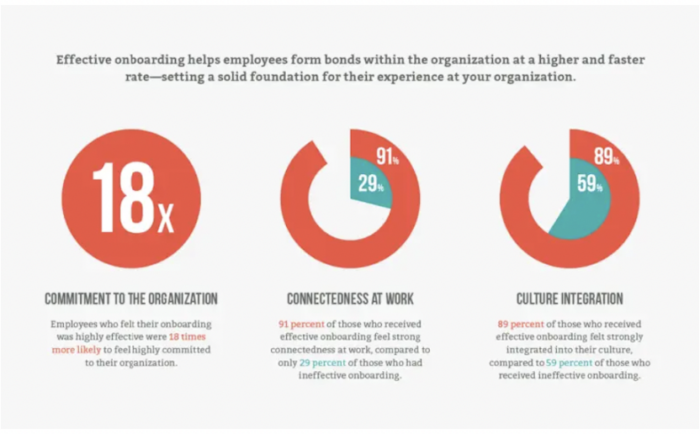How Onboarding Has Transformed Into a Full-Blown Production
In the ever-evolving workplace landscape, the transition to hybrid work models has precipitated a seismic shift in how companies approach onboarding. No longer a mere formality, it has become a pivotal, full-blown production essential for weaving new hires into a company’s culture and operations.
Given the complexities of the hybrid era, employers are increasingly investing in comprehensive, thoughtfully segmented onboarding processes. This strategic shift is not just about acclimating employees to their new roles; it’s about anchoring them to the company’s mission, values, and community, enhancing retention, and fostering a deep sense of belonging and commitment.
The Importance of Thoughtful, Properly-Segmented Onboarding
The hybrid work model, a blend of remote and in-office work, presents unique challenges and opportunities for integrating new hires. The lack of physical presence and reduced face-to-face interactions can make assimilating into a new role and company culture more daunting for remote workers. Recognizing this, employers are designing onboarding processes that are not only comprehensive but segmented and tailored to address the distinct needs of their hybrid workforce.
A segmented approach ensures it is not a one-size-fits-all affair but a personalized experience that acknowledges new employees’ diverse backgrounds, roles, and working preferences. This method involves structured phases, clear milestones, and regular check-ins, facilitating a smoother transition into the company. By investing time and resources into developing an engaging experience, employers signal their commitment to the employee’s success and well-being from day one.
Company Culture at the Forefront
Company culture has ascended to the forefront of employers’ priorities. As the infographic from BambooHR highlights, effective onboarding is critical in imparting the company’s culture, values, and expectations to new hires. This initial introduction can significantly influence an employee’s perception of the organization and their place within it.

Cultivating a strong company culture when an employee joins is crucial in a hybrid work environment, where building connections and fostering a sense of belonging can be challenging. Employers are incorporating virtual team-building activities, one-on-one mentorship programs, and interactive sessions on company history and values into their processes. These initiatives help bridge the physical distance between team members, ensuring remote employees feel as integrated and valued as their in-office counterparts.
Improving Overall Retention
The stakes for getting onboarding right are high. A well-executed process can be the best tool employers have to combat turnover and ensure new hires feel engaged and less likely to leave. The initial weeks and months of employment are critical for setting the tone of an employee’s experience and can significantly affect their decision to stay with the company long-term.
Effective onboarding goes beyond job training; it encompasses efforts to connect new hires with their peers, immerse them in the company culture, and provide clear pathways for growth and development. Employers can significantly improve job satisfaction, loyalty, and overall retention rates by addressing these areas. As well, employees who feel adequately onboarded are more likely to report high levels of job satisfaction and remain with the company for extended periods.
Onboarding Done Right
However, achieving the benefits of onboarding requires more than just good intentions; it demands a deliberate and strategic approach. Employers must intentionally design onboarding experiences that are engaging, informative, and responsive to the needs of a diverse and distributed workforce. This includes leveraging technology to facilitate virtual interactions, creating accessible resources and support networks, and continuously seeking feedback to refine and improve the onboarding process.
Furthermore, onboarding should not be seen as a one-time event but as an ongoing journey of integration and development. Employers that adopt this mindset will be better positioned to build a cohesive, resilient, and motivated workforce ready to navigate the challenges and opportunities of the hybrid work landscape.
As the workplace continues to evolve, so must the approaches we take to welcome and integrate new employees. The hybrid era has turned onboarding into a full-blown production, and for good reason. Thoughtful, properly segmented onboarding that prioritizes company culture is beneficial; it’s essential for fostering engagement, enhancing retention, and building a strong organizational foundation.
Employers who recognize and act on this will not only combat turnover but also cultivate a workforce that is connected, committed, and equipped to thrive in today’s dynamic work environment.







